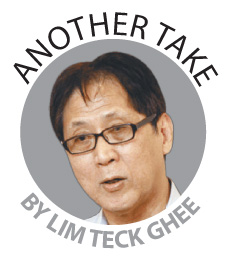THE recent proposal by a group of academics to raise RM4-5 million from sponsors to produce inclusive history textbooks for secondary school students should raise public alarm bells not just on the issue of the pricing of the project.
It should also induce questions as to why such a project is necessary and a host of related questions on the extent to which the curriculum for other taught and examined subjects – besides history – suffer from similar problems of racial, religious or political bias in one form or another.
First, on the issue of an inclusive history there is little doubt that the practice of under-representing the contribution of the minority communities has steadily become more pronounced with top-down history rewriting going on for several decades and taking place at many levels – not simply with textbooks.
We see it in the changes in the names of streets, in the depiction of momentous historical events in official film, radio and other media, in the displays of museums, in the syllabuses of universities, etc.
We also see it in the Biro Tatanegara and the information bureaus of government bodies and their attempts to reshape the thinking and consciousness of the younger generation on the national past and present, as well as the past of ancient and recent civilisations, and the key events and personalities that are shaping the world.
Has this history rewriting helped to produce a young generation that is critical, perceptive, analytical, and insightful? Has it produced more knowledgeable students with inquiring yet open minds? Has it produced more loyal and patriotic Malaysians? Has it produced a higher quality of nationalism that is inclusive, progressive and liberal?
The short answer to most if not all these questions is clearly “no”.
Kempen Sejarah Malaysia Sebenar – proposals for change
Until recently, it has been an uneven battle to bring about an inclusive history because of a government which has been supported in its political and socio-religious agenda by a racially imbalanced and less accountable bureaucracy and by academic entrepreneurs who dominate the official historical space with their limited scholarship and politically and religiously-skewed books.
In response, a civil society movement, Kempen Sejarah Malaysia Sebenar (KemSMS) was launched in May 2011 to push for change to ensure:
» A broad and balanced perspective of the major civilisations and events in world history;
» Accurate historical facts on Malaysia’s historical development from an unbiased viewpoint;
» Due and fair recognition of the contribution of all communities in the historical development of the nation.
The rationale for the movement’s existence was simple.
We are a multiracial, multi-religious and multi-cultural society and our history must reflect this to be true to what happened in the past and to foster a sense of belonging.
Interestingly, a similar sentiment was expressed in 2017 by a joint Association of Voices of Peace, Conscience and Reason (PCORE)/Department of History, Universiti Malaya forum on “The study of history: Its relevance and significance” which called for the younger generation of students to be instilled with “a good grasp of the country’s history based on the shared historical memory of Malaysia’s multifarious, multiethnic society ... which will inspire in them the love for history and the land of their birth.”
In December 2011, KemSMS leaders met the special committee to study the history curriculum and textbooks in secondary schools to present proposals and recommendations to bring about a balanced and progressive history education.
The work of KemSMS was supported by studies which analysed the shortcomings in the history curriculum and textbooks used in schools. A process of consultation with respected academicians, professionals and parents had been previously undertaken and a petition campaign calling for a return to a truly Malaysian history was launched which received over 20,000 signatories.
Although KemSMS is no longer active, its recommendations on history curriculum and textbooks reform which were ignored by the previous policymakers are useful to reproduce for the new education minister’s examination.
Not only are these proposals still valid but the standards of scrupulously non-partisan knowledge and values of an inclusive society that they espouse need to be applied to the entire range of primary and secondary school subjects besides history.
Only through this approach can we attain in the words of the Ministry of Education in its Malaysia Education Blueprint 2013-2025 “an all-rounded curriculum benchmarked to international standards to produce students with the skills required to compete at an international level ... (with) the application of knowledge and the development of critical, creative and innovative thinking skills.”
Reform proposals on textbooks
» Review the system of textbook selection to be reflective of our multiracial and multi-cultural society
» Ensure the existing system of textbook selection is transparent
» Invite feedback from the public and education experts on ways to reform the present textbook system which has not produced quality outcomes
» Require history books selected as textbooks to be written by historians or social scientists with a strong historical specialisation and with expertise in the subject matter
» Require co-authored textbooks to include multiracial teams rather than teams from one single ethnic or religious community to reduce racial and religious bias
» Require the history textbook selection committee to consult an independent panel of experts before approval of the text
» Membership in the textbook selection committee should be made publicly known and should reflect our multiracial and multi-religious society
» Selection of textbook authors should be by an open tender process. This will ensure that the best people are chosen to write the books and reduce the risk of abuse or corrupt practices
» The system of using compulsory history texts should be reviewed in favour of one which is more liberal and allows the use of diverse texts by teachers and schools
Lim Teck Ghee’s “Another Take” is aimed at demystifying status quo orthodoxy. Comments: letters@thesundaily.com













